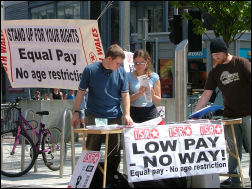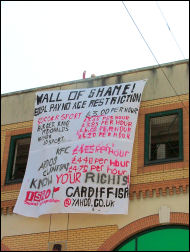International Socialist Resistance (ISR) Feature
Young people – fight for your rights!

Fed up with bullying bosses, long hours and unsafe working
conditions? As young people, we very often end up in low-paid shop, bar,
catering or factory work. Often these jobs are casual or part-time in
unsafe conditions.
Top Shop boss Philip Green pays himself £1.17 billion tax-free and
gets a knighthood. It would take a 16-year-old on the minimum wage
working in one of his shops almost 200,000 years to earn that much. This
huge inequality is unsurprising in a world where 24% of global wealth is
controlled by just 0.01% of the population.
 Young people often bear the brunt of the growing exploitation
Young people often bear the brunt of the growing exploitation
required to sweat out these huge profits. But that is only one side of
the story.
In this feature young members of the Socialist Party and of
International Socialist Resistance (ISR) describe their experiences of a
system that puts profit before any other consideration, and what they
intend to do about it.
Young people have been at the forefront of fighting attacks on
education and working rights in Chile, France, Greece and many other
countries. The same profit-lust that has driven young people across the
world to stand up and fight back, will force young people in Britain to
say enough is enough. We have to fight for our future.
 ISR is launching a campaign for the immediate end to the lower rates
ISR is launching a campaign for the immediate end to the lower rates
of pay for young people and to raise the minimum from a poverty wage to
a living wage. We want to work with the trade unions and with
unorganised workers.
We want to organise meetings in colleges and universities to
introduce the Know your rights campaign and link up with young people
across the country who are ready to make a stand against what is seen by
the fat-cats as a right to make millions off our backs.
-
Replace the job agencies with a publicly run and funded service that
serves the job seeker not the greed seekers. -
For the trade unions to organise agency workers against cuts,
privatisation and low pay. -
For the trade unions to fight for secure, well-paid contracts and the
end to ‘McJobs’. -
The immediate introduction of the current trade union minimum wage,
such as the UNISON demand for £6.50 an hour, as a step towards a minimum
of £8.00 an
hour for all, the EU decency threshold. -
The right to a job, training and free quality education.
-
No to university top-up fees. For a living grant for all.
-
A £60 a week Education Maintenance Allowance for all FE students as a
step towards a living income for all students. -
Scrap the New Deal for young people, job seekers allowance and
welfare to work. For full benefits without compulsion.
Equal pay for equal work
"It does seem unfair that I earn £1 an hour more than my girlfriend
just because she’s a year younger than me, especially when we do exactly
the same job." This was the response of one young supermarket worker
when I spoke to him about the inequalities in the national minimum wage.
Steve North, Manchester
We know that the adult minimum wage of £5.05 an hour is not nearly
high enough and this is why ISR and the Socialist Party campaign for an
immediate increase to £8 an hour. But when we look at the minimum wage
for workers under the age of 22 we are doubly appalled at the poverty
pay that young people are being forced to live on under New Labour.
For 18-21 year olds, the minimum wage is only £4.25, and under-18s
receive just £3 for every hour they work – this hasn’t been raised since
it was introduced two years ago.
 The Department of Trade and Industry is now trying to get these youth
The Department of Trade and Industry is now trying to get these youth
rates exempted from the EU anti-age discrimination directive later this
year. This legislation means that workers doing the same job are paid
the same wage regardless of their age, but the government doesn’t want
to deprive its big-business friends of the cheap labour that young
people can provide.
A recent survey initiated by the Mayor of London’s Low Pay Unit
concluded that there is a ‘poverty threshold wage’ of £5.80 an hour for
people living in the capital. This is a very low estimate as to what
people need to have a decent standard of living in London and 16 and
17-year-olds on the minimum wage in the capital are only earning just
over half of that!
The government’s response is to claim that young people don’t need to
earn as much as older workers because they can rely on their families to
assist them with necessities like food, rent, bills etc.
This suggestion – that young people just work for ‘pin money’ – is a
smack in the face for the thousands of working-class young people whose
lives do not conform to such a sanitised and patronising view. The
government accepts that people can leave home at 16, but not that money
is needed to do this. But even those who do remain at home often can’t
rely on their families for support for the simple reason that their
parents earn hardly enough to support themselves.
The New Labour government argues that a higher minimum wage would
mean more young people dropping out of education at 16 in order to work.
This is typical of its negative approach to young people – they try to
suggest that it’s the lure of the money available in full-time work that
prevents young people from continuing in education!
But young people who do decide to educate themselves after 16 are
punished for it. 16 and 17-year-olds may be entitled to £3 per hour, but
those taking part in traineeships or modern apprenticeships are not even
entitled to this amount. This means that many young workers are taking
home less than £50 for a week of full-time work. A recent UNISON report
calculated the average completion rate of such schemes to be only 27%.
Another problem with modern apprenticeships and trainee courses is
the lack of information and opportunity available to young workers after
they have completed their course.
It operates similarly to the "indentured labour" scheme of the past –
young apprentices were employed for several years on low pay and then
sacked when their apprenticeship was finished, instead of being offered
higher paid jobs. They were sacked to make way for another layer of
young workers and left their apprenticeships under-qualified and often
unemployed.
We, in ISR and the Socialist Party are demanding "Equal pay for equal
work" and are linking up and campaigning with young workers who are
suffering the effects of this discrimination.
As socialists, however, we cannot afford to isolate this issue from
the wider problems of capitalist society, where working-class people,
young and old, are treated merely as cheap labour and where the human
needs of the many are disregarded in the interest of the few.
Job agencies = double exploitation
An estimated 700,000 workers are now sitting on the books of
employment agencies in Britain and most are under the age of 26.
Especially in the semi- and unskilled sectors there are many agency
workers who receive no sick pay, work pension, protection from unfair
dismissal, or training and are often paid less than permanent colleagues
doing similar work.
The numbers of young workers resorting to an agency to find work has
sky rocketed over the last decade. The collapse of manufacturing
industry, coupled with constant cuts in the Department for Work and
Pensions, has meant that, in some areas of the country, agencies now
have a virtual monopoly on the job market.
Adam Dudley, Stoke on Trent
In Stoke, the number of job agencies has more than doubled over the
last five years. Many workers literally have no choice but to turn to
casual work.
The conditions these workers face are often straight out of the
1930s. It was the norm then for workers to line up in front of the
‘labour master’ and wait to be picked for their day’s work.
Once in work the situation isn’t much better. I recently spoke to a
young agency worker called Alex who explained how he’d spend ten hours a
day sharpening metal spikes with a machine which really was out of the
1930s! It would leak what looked like toxic waste, all over him, all the
time, meaning he’d have to spend most of his dinner hour trying to scrub
the stuff off his hands and face. For that he was paid £3 an hour and
was only paid for seven of the hours he had worked.
Investigations by the TUC have shown that a number of agencies
routinely make deductions from temporary workers for cashing pay
cheques, transport, accommodation and providing clothing and safety
equipment. This brings the hourly rate for many agency workers to below
the current minimum poverty wage. The reports also show that those most
affected are young people and migrant workers.
Temporary workers do have some legal protection but are usually in
too vulnerable a position, dependent on the agency for work and unaware
of their rights or the role of a trade union, to effectively fight back.
Employment agencies are well aware of this and often discourage
employees from joining a trade union. It is urgent that the unions step
up their work amongst agency workers – they are angry and many are ready
to fight back. It’s the role of socialists in and outside the trade
unions to make sure that young workers on temporary contracts are
encouraged to organise.
Shopping around for the easiest to exploit
"We don’t give full-time jobs on checkouts be-cause it’s just too
boring and we don’t want you going brain-dead!" Yeah right. When you ask
for a full-time job on the checkouts in Tesco what they really mean to
say is: "Although we made £2.2 billion in profits last year we don’t
give full-time jobs because we don’t want to pay national insurance
contributions for you".
Alex Gounelas
Cardiff The fact is it’s very hard to get full-time work anywhere in
retail as a part-time, skint workforce is all the more compliant and
flexible to the employers’ needs. From major understaffing in Woolworths,
to a nightmare sequence of split-shift patterns in 24-hour Spars or
Tescos – with the 3% absence-and-you’re-out sickness policy (SYA-Supporting
Your Attendance, better known as ‘Sacking Your Assistant’), every
company has its slave-driving tactics.
Fight for your rights at work
What can motivate a young shopworker to feel that we can change
company policy and that there’s more to work than dreaming of pay day?
The only answer can be a fighting union and there is no doubt that more
than in any sector (along with catering) there is more than enough to be
angry about.
The European decency threshold, which is based on 68% of the average
adult earnings is £275.60 a week, yet sales and retail assistants’
earnings are well below at £244.95 for men and £218.85 for women.
Average earnings increases for retail are 1.6% while average earnings
increases generally stand at 3.8%. And these figures don’t even touch on
the inequality faced by retail workers earning below the adult rate. All
this during a major boom period for the shopping giants.
This of course makes low pay and rights at work the biggest
campaigning issues for ISR and we can use it as the best recruiting
agent of young workers to unions. Out of 2.6 million retail workers only
a tiny percentage are in trade unions (the biggest retail union USDAW
has only 340,000 members), but with the right strategy large numbers of
young workers in particular can be unionised. Along with ISR’s Know your
rights and Low pay No way! campaigns, this could hugely improve their
understanding of how they can fight back.
In some stores, where we have 80% staff turnover, the reality is that
the majority of young workers, a third of the workforce, don’t know what
a trade union is. This is hardly a surprise when their union has spent a
large part of the last twenty years literally marketing itself as an
insurance policy!
Can the unions fight effectively for young workers?
In the last five years, the union leadership, concerned that the drop
in numbers joining will hit the union’s finances, have decided to adopt
‘the organising model’. This means turning the union into a campaigning
union and attracting new members on the basis, not of the service you
provide, but by organising stores so that members play an active part
and turn the union into their own.
This idea, dubbed ‘new unionism’ (in reference to the beginning of
the formation of the union movement), is of course the only way a union
can particularly attract young people, who will not automatically join
as in the past.
In practice, USDAW’s national policies of class collaboration and
partnership with its biggest wealth earner, Tesco, means that any
organising model is strictly superficial as a union without teeth can’t
effectively campaign on anything. This is why it is so important for new
blood to turn the union around.
USDAW’s main campaign at the moment is against the extension of
opening hours for Sunday trading. This is a big issue as, in the eyes of
most workers, it is linked to the deregulation of Sunday working – in
particular the erosion of hourly premium entitlements.
Of course the union cynically uses the campaign as a recruitment tool
knowing that the extension of hours has already been agreed in a meeting
of John Hannet, USDAW secretary, Blair and Tesco’s Terry Leahy.
However it is through recruiting young workers on the basis of giving
a lead on this campaign that the real and urgent need for a fighting
union becomes clear.
Although small, there is a number of active young reps genuinely
building the campaign by collecting petitions and appealing to other
young members to join the youth committees and fight for Sunday
double-time for all.
Linking up the issues of low pay and union campaigns such as this paves the way for a new generation of shopworkers to gain a voice and transform our unions into genuine mass forces for change.
Weekend of action – 15-16 July

ISR are calling a weekend of action, to fight for equal pay for equal
work, but also for a wage that allows people a decent standard of living
that’s earned through hard work.
We have produced leaflets, Know your rights at work cards, low pay
packs and petitions demanding an increase in the minimum wages for young
workers.
We will be collecting the petitions in order to show support for the
campaign, and we are planning to hand them into the Labour Party
conference in Manchester in September to show Blair and Brown what young
people really think, and the massive opposition to their divisive and
unfair policies.
Some ideas for campaigning:
- Use the petitions to collect signatures and hand out leaflets
explaining the campaign. - Have a ‘Wall of Shame’ (see left) for young workers to highlight the
lowest paying bosses. ‘Out’ the biggest Scrooge by leafleting and
campaigning outside the workplace – do a press release to advertise what
you are going to do. - Leaflet young workers with our Know your rights at work cards,
explaining their rights at work and the importance of trade unions. - Organise public meetings on the issues of low pay, linked in with
this campaign and other campaigns that ISR are involved in. Encourage
interested people to buy the ISR Low pay – no way! campaigning pack, for
50p. - Have regular campaigning stalls, featuring the leaflets, cards,
petitions, campaign packs, the ISR magazine Socialist Youth and the
socialist, as well as other material that people might be interested in.
Contact us for more details.
If you would like to order copies of the material mentioned above, or
assistance and advice in building an ISR group and the low pay campaign,
contact us on 02085587947 PO Box 858, London, E11 1YD






